The AMD Ryzen Threadripper 3960X and 3970X Review: 24 and 32 Cores on 7nm
by Dr. Ian Cutress, Andrei Frumusanu & Gavin Bonshor on November 25, 2019 9:05 AM ESTCPU Performance: Web and Legacy Tests
While more the focus of low-end and small form factor systems, web-based benchmarks are notoriously difficult to standardize. Modern web browsers are frequently updated, with no recourse to disable those updates, and as such there is difficulty in keeping a common platform. The fast paced nature of browser development means that version numbers (and performance) can change from week to week. Despite this, web tests are often a good measure of user experience: a lot of what most office work is today revolves around web applications, particularly email and office apps, but also interfaces and development environments. Our web tests include some of the industry standard tests, as well as a few popular but older tests.
We have also included our legacy benchmarks in this section, representing a stack of older code for popular benchmarks.
All of our benchmark results can also be found in our benchmark engine, Bench.
Speedometer 2: JavaScript Frameworks
Our newest web test is Speedometer 2, which is a accrued test over a series of javascript frameworks to do three simple things: built a list, enable each item in the list, and remove the list. All the frameworks implement the same visual cues, but obviously apply them from different coding angles.
Our test goes through the list of frameworks, and produces a final score indicative of ‘rpm’, one of the benchmarks internal metrics. We report this final score.
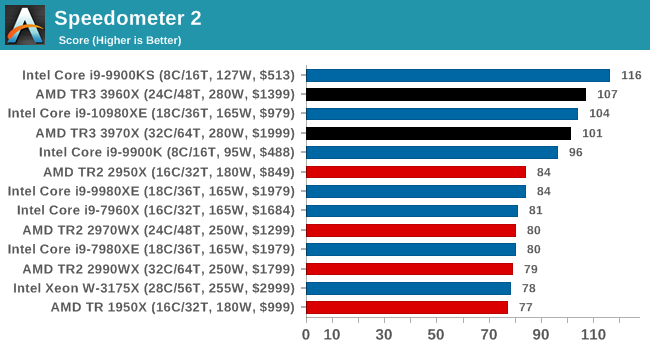
Google Octane 2.0: Core Web Compute
A popular web test for several years, but now no longer being updated, is Octane, developed by Google. Version 2.0 of the test performs the best part of two-dozen compute related tasks, such as regular expressions, cryptography, ray tracing, emulation, and Navier-Stokes physics calculations.
The test gives each sub-test a score and produces a geometric mean of the set as a final result. We run the full benchmark four times, and average the final results.
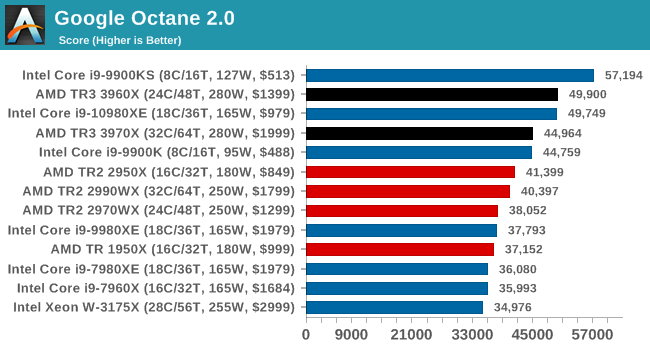
Mozilla Kraken 1.1: Core Web Compute
Even older than Octane is Kraken, this time developed by Mozilla. This is an older test that does similar computational mechanics, such as audio processing or image filtering. Kraken seems to produce a highly variable result depending on the browser version, as it is a test that is keenly optimized for.
The main benchmark runs through each of the sub-tests ten times and produces an average time to completion for each loop, given in milliseconds. We run the full benchmark four times and take an average of the time taken.
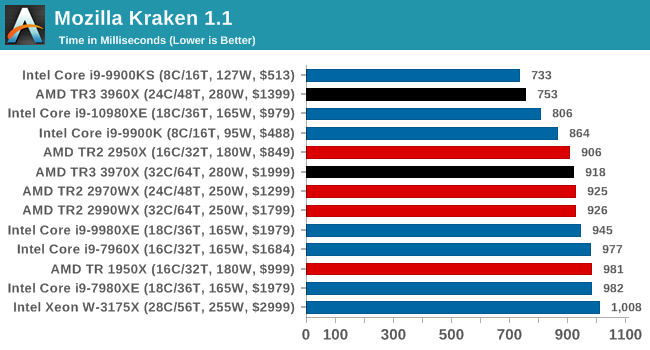
3DPM v1: Naïve Code Variant of 3DPM v2.1
The first legacy test in the suite is the first version of our 3DPM benchmark. This is the ultimate naïve version of the code, as if it was written by scientist with no knowledge of how computer hardware, compilers, or optimization works (which in fact, it was at the start). This represents a large body of scientific simulation out in the wild, where getting the answer is more important than it being fast (getting a result in 4 days is acceptable if it’s correct, rather than sending someone away for a year to learn to code and getting the result in 5 minutes).
In this version, the only real optimization was in the compiler flags (-O2, -fp:fast), compiling it in release mode, and enabling OpenMP in the main compute loops. The loops were not configured for function size, and one of the key slowdowns is false sharing in the cache. It also has long dependency chains based on the random number generation, which leads to relatively poor performance on specific compute microarchitectures.
3DPM v1 can be downloaded with our 3DPM v2 code here: 3DPMv2.1.rar (13.0 MB)
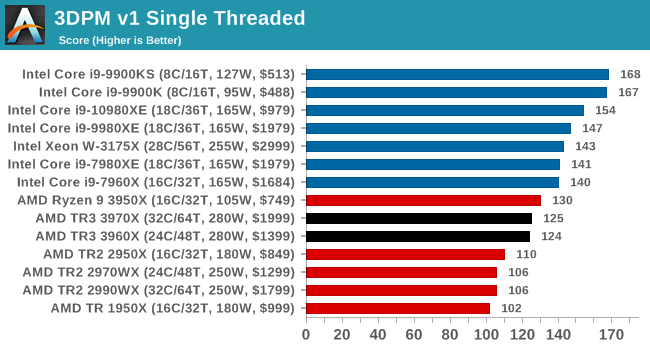
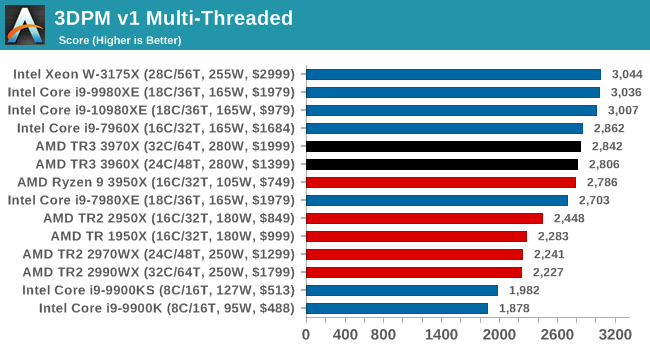
x264 HD 3.0: Older Transcode Test
This transcoding test is super old, and was used by Anand back in the day of Pentium 4 and Athlon II processors. Here a standardized 720p video is transcoded with a two-pass conversion, with the benchmark showing the frames-per-second of each pass. This benchmark is single-threaded, and between some micro-architectures we seem to actually hit an instructions-per-clock wall.
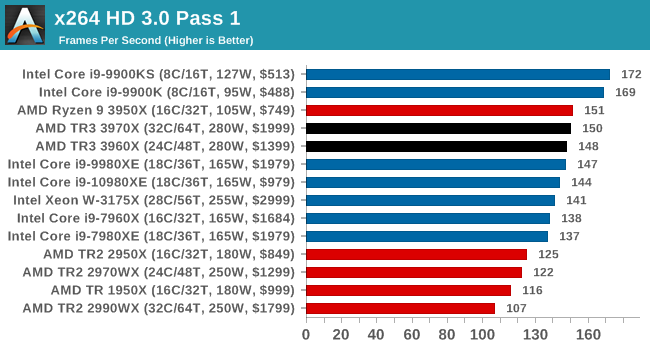
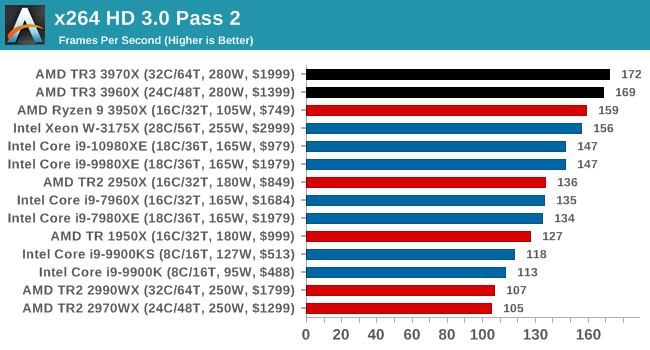
GeekBench4: Synthetics
A common tool for cross-platform testing between mobile, PC, and Mac, GeekBench 4 is an ultimate exercise in synthetic testing across a range of algorithms looking for peak throughput. Tests include encryption, compression, fast Fourier transform, memory operations, n-body physics, matrix operations, histogram manipulation, and HTML parsing.
I’m including this test due to popular demand, although the results do come across as overly synthetic, and a lot of users often put a lot of weight behind the test due to the fact that it is compiled across different platforms (although with different compilers).
We record the main subtest scores (Crypto, Integer, Floating Point, Memory) in our benchmark database, but for the review we post the overall single and multi-threaded results.
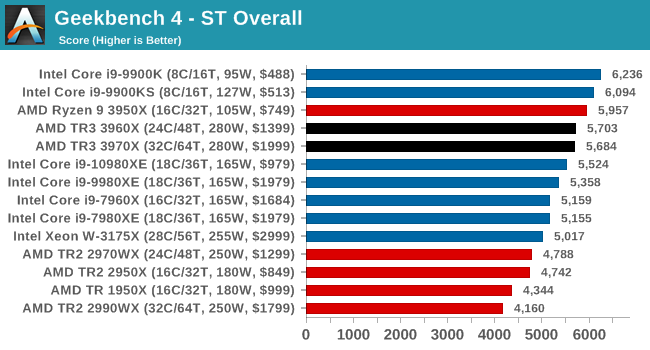
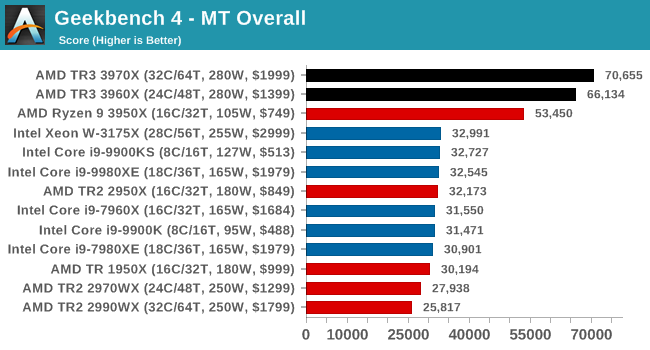










245 Comments
View All Comments
Fulljack - Wednesday, November 27, 2019 - link
well, even 64eu gen11 graphics actually couldn't even surpass vega 10 on 3700u.YazX_ - Monday, November 25, 2019 - link
@melgross, LOL cool story, your butthurt is so obvious, being a fanboy is something but living in denial is something else.the only reason one would post such comment is to be an Intel employee, heck, even Intel employees are admitting their defeat.
JKflipflop98 - Wednesday, November 27, 2019 - link
No, we're not.mickrussom - Tuesday, December 3, 2019 - link
If you really are an Intel employee- shame!, shame!, shame! - especially if you had anything to do with:Spectre 1/2, Meltdown 3/3a, Speculative Store Bypass, Foreshadow, L1TF, Fallout/MSBDS, ZombieLoad/MFBDS, RIDL MLPDS/MDSUM
It is utterly criminal what Intel has done. I have zero respect for Intel and it is only by the grace of the US Government Intel is allowed to live. What is happening to Boeing should be happening to Intel for the criminally negligent brain damaged cheating lying trash-chips they have produced with these horrific faults for over a decade. This is far worse than FDIV. And I got a new CPU for FDIV. This is a crime wave and Intel has received a pardon and all of us are left with broken chips that when patch by the OS run half speed or worse.
So to all Intel employees, you better hold your heads down in utter shame until the next wave of CPUs comes out. And support ECC on all the chips - its criminally negligent to hold people hostage with RAM errors.
WaltC - Monday, November 25, 2019 - link
You don't really understand how the quarterly bookkeeping works, I can see. Intel's last quarter was already set in their ordering channels long before AMD's July launch of Epyc Zen 2, R3k, and TR3k is only now launching--it will be all of 2020 that you will see Intel's P&L's grow progressively leaner as you see AMD's grow progressively fatter. Generally it takes 2-3 quarters of progressively worse business before a company's woes begin to show up dramatically on the balance sheet, due to good will and other bookkeeping dodges. Next year will be a Halcyon year for AMD and a critical year for Intel no question about it. Already their roles have reversed, with Intel becoming the "value proposition"--but only provided Intel keeps on cutting its prices. What we've also seen predicted many times in the past is that AMD was *doomed*...;) Not..quite..;)Jimbo Jones - Monday, November 25, 2019 - link
@melgrose"Intel had its best year yet" ... more 10nm delays, so called "14nm shortages", no 10nm for desktop yet, nothing for server yet, same rehashed 14nm with the 10980XE bringing almost no improvement at all per core meanwhile in one generation Threadripper beings up to 32% improvement in multi, 20% in single thread, with no answer from Intel to any of these processors at all and their flagship 18 core HEDT being almost equal to Ryzen desktop in heavy workloads.
But that's ok, let's look ahead to 2020 ... Comet lake aims at add two cores and add 100mhz ... I guess that's pretty good ... for Intel ... ;-)
What IS impressive though, is Intel's ability to keep squeezing money out of gullible people willing to keep paying more money for less product -- I guess that's how they managed to make so much money last year?
mickrussom - Tuesday, December 3, 2019 - link
yeah, how quickly they forget Spectre 1/2, Meltdown 3/3a, Speculative Store Bypass, Foreshadow, L1TF, Fallout/MSBDS, ZombieLoad/MFBDS, RIDL MLPDS/MDSUM. they took our money and unlike Boeing they go no flak from FEDGOV for it. and then they act like arrogant rotten gordon gecko types while laughing to the bank while the CPUs still coming are patch against those flaws mostly in microcode and OS kernels STILL!maxxbot - Tuesday, November 26, 2019 - link
AMD didn't have these sorts of products in the past, trying to extrapolate past performance into the future is a fool's errand. Intel was the process champ for decades and guess what? It all changed overnightTargon - Tuesday, November 26, 2019 - link
Financials vs. products. Intel financials were up because many people were upgrading from older dual or quad core products, and OEMs are barely starting to offer third generation Ryzen based machines. For your typical consumer, not the gamers who can afford a $500 9900k, but your typical consumer, would you suggest Intel or AMD based products at this point? Intel has the 9600, 9700, and 9900 as good products, the rest are beaten by AMD products at the same price point.arcamdomain - Tuesday, December 17, 2019 - link
Nokia said the same thing about the phone market.